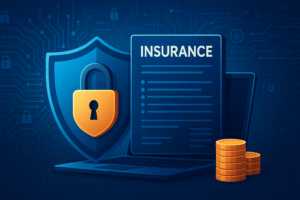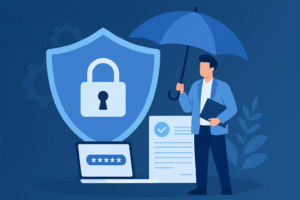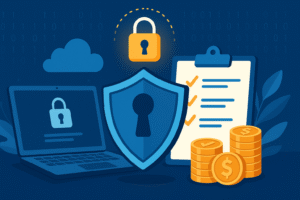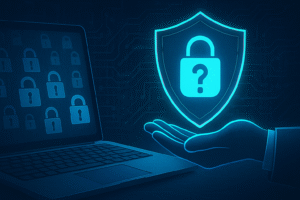Wondering if you need cyber insurance? You’re not alone. Cyber attacks happen every day to people and businesses of all sizes. Cyber insurance can help protect you when your data gets stolen or your devices get hacked. Let’s find out if you need this protection and how to choose the right cover.
The Growing Risk of Cyber Threats
Cyber attacks are getting worse each year. In 2023, cyber crimes cost the world over £6 trillion. That’s a lot of money! About 60% of small businesses that get attacked go out of business within six months.
Data breaches now affect millions of people. Even big companies like British Airways and Marriott Hotels have been hit. No one is too small to be a target anymore.
Why Cyber Insurance is Gaining Attention
As attacks grow, more people are getting cyber insurance. Many business owners now see it as a must-have, not just a nice-to-have.
“Cyber insurance has become as important as fire insurance for modern businesses.” – UK Cyber Security Centre
The COVID-19 pandemic made things worse. With more people working from home, hackers found new ways to break into systems. This led to a 400% increase in cyber attacks during 2020.
1. What is Cyber Insurance?
Definition and Purpose
Cyber insurance (also called cyber liability insurance) protects you against losses from computer-based attacks. It helps pay for recovery costs when your data gets stolen or your systems get hacked.
Think of it like home insurance, but for your digital life. Just as home insurance helps fix your house after a fire, cyber insurance helps fix your digital world after a hack.
Types of Coverage Offered
There are two main types of cyber insurance:
- First-party coverage: Pays for your direct losses, like fixing your systems, recovering data, and dealing with business downtime.
- Third-party coverage: Covers claims against you when other people’s data that you hold gets breached.
Most policies offer both types. Some also include special coverage for things like:
- Cyber extortion
- Media liability
- Reputation damage
- Credit monitoring services
2. Who Needs Cyber Insurance?
Individuals vs. Businesses
For individuals, cyber insurance might be worth it if you:
- Have significant digital assets (like large crypto holdings)
- Run an online business from home
- Store sensitive data on your devices
- Have smart home systems that could be hacked
For businesses, cyber insurance is almost always a good idea, especially if you:
- Store customer data (names, addresses, payment info)
- Depend on computers to run your business
- Process online payments
- Have employees who work remotely
A recent survey found that 88% of UK businesses that experienced a breach were glad they had cyber insurance.
Industries at Higher Risk
Some industries face bigger cyber risks than others:
| Industry | Risk Level | Why? |
|---|---|---|
| Healthcare | Very High | Patient data is valuable to criminals |
| Financial Services | Very High | Direct access to money |
| Retail | High | Customer payment details |
| Education | High | Student data and research |
| Manufacturing | Medium | Intellectual property theft |
Small businesses are often targeted because they usually have weaker security. About 43% of all cyber attacks now target small businesses.
3. Common Cyber Threats Covered
Data Breaches and Hacking
A data breach happens when someone steals information from your systems. This could be:
- Customer details
- Payment information
- Personal data
- Company secrets
Data breaches cost UK businesses an average of £3.9 million per incident. Good cyber insurance helps cover these costs and the damage to your reputation.
Most policies will pay for:
- Finding the source of the breach
- Notifying affected customers
- Credit monitoring for affected people
- PR help to manage your reputation
Phishing, Ransomware, and Malware
Phishing tricks people into giving away passwords or bank details. About 90% of data breaches start with a phishing email.
Ransomware locks up your files until you pay money to criminals. The average ransom payment is now over £150,000.
Malware is bad software that damages your systems. It can steal data or spy on your activities.
Good cyber insurance covers all these threats. It helps pay ransoms (if legal) and fixes systems damaged by malware.
4. Financial and Legal Protections
Recovery Costs and Business Interruption
When you’re hacked, getting back to normal can be expensive. Cyber insurance helps pay for:
- IT experts to fix your systems
- Data recovery services
- Lost income while your business is down
- Extra expenses to keep running
A study showed that businesses with cyber insurance recovered 60% faster from attacks than those without it.
Legal Liabilities and Fines
If your data breach affects customers, you might get sued. You could also face fines under laws like GDPR.
Cyber insurance can cover:
- Legal defence costs
- Settlements and damages
- Regulatory fines (where insurable)
- GDPR penalties (up to 4% of annual turnover)
In 2020, the ICO fined British Airways £20 million for a data breach. Good cyber insurance might have covered some of this.
5. How Much Does Cyber Insurance Cost?
Factors Influencing Premiums
What you pay depends on:
- Size of your business: More employees = higher risk
- Type of data you hold: Sensitive data costs more to insure
- Security measures: Good security can lower your premium
- Previous incidents: Past claims may increase costs
- Coverage limits: More protection costs more
Insurance companies look at your security before setting prices. Having good passwords and regular backups can save you money.
Average Costs for Individuals and Businesses
For individuals, personal cyber insurance often costs:
- £100-200 per year for basic cover
- Up to £400 for comprehensive protection
For businesses, costs vary widely:
- Small businesses: £500-1,500 per year
- Medium businesses: £2,000-10,000 per year
- Large companies: £10,000+ per year
The average claim amount is now about £50,000, making even expensive policies worth considering.
6. How to Choose the Right Policy
Assessing Risk and Needs
Before buying, ask yourself:
- What valuable data do I have?
- How would I cope if my systems went down?
- Could I afford recovery costs myself?
- Do my customers expect me to have coverage?
Make a list of your most important digital assets. Then find policies that protect them well.
Comparing Providers and Coverage
Not all cyber insurance is the same. Look for:
- Clear wording: Understand exactly what’s covered
- Incident response: 24/7 help when you’re attacked
- Specialist support: Access to cyber experts
- Preventative tools: Some policies include security scans
“The best cyber insurance doesn’t just pay claims – it helps prevent them.” – UK Insurance Guild
Ask if the policy covers the latest threats like deepfakes or social engineering attacks.
7. Alternatives and Complements to Cyber Insurance
Cybersecurity Best Practices
Insurance works best with good security practices:
- Use strong, unique passwords
- Turn on two-factor authentication
- Keep software updated
- Back up data regularly
- Use secure networks
These steps can reduce your chances of being attacked by up to 80%.
Employee Training and IT Protocols
For businesses, your people are often your biggest risk. Invest in:
- Regular security training
- Clear policies about data handling
- Secure remote work practices
- Incident response plans
Companies that train employees face 70% fewer successful attacks. Even with insurance, prevention is always better than cure.
8. Real-Life Examples of Cyber Insurance in Action
Business Case Studies
Small Accounting Firm, London This firm was hit by ransomware that locked all client tax records. Their cyber insurance paid the £30,000 ransom and covered IT support to clean their systems. The insurance also paid for income lost during the three days they couldn’t work.
Online Retailer, Manchester When hackers stole 15,000 customer credit card details, this company faced huge problems. Their cyber insurance covered the £75,000 in notification costs, provided credit monitoring for customers, and paid legal fees when five customers sued.
Individual Protection Stories
Home Worker, Cardiff When this freelancer’s laptop was hacked, the criminals stole client work and demanded £2,000. His personal cyber insurance paid the ransom and provided a security expert to make sure his devices were safe again.
Family in Edinburgh After their smart home system was hacked, intruders gained access to their security cameras. Their cyber insurance paid for a security consultant to secure their entire home network and covered therapy sessions for the distressed children.
Conclusion
Cyber insurance is becoming essential in our digital world. Most businesses should have it, and many individuals would benefit too. Here’s what to do next:
- Make a list of your digital assets and how they could be attacked
- Ask insurance providers for quotes based on your needs
- Improve your security to lower your premium costs
- Review your policy yearly as threats change
Remember, the best protection is a mix of good security practices and the right insurance cover.
FAQs about Cyber Insurance
What’s the difference between cyber insurance and regular business insurance?
Regular business insurance rarely covers digital risks. Cyber insurance is specially designed to protect against hacking, data theft, and online threats.
Does cyber insurance cover social engineering attacks?
Some policies cover social engineering (like fake boss emails asking for money transfers), but you should check. Many insurers are adding this coverage.
Can individuals get cyber insurance or is it just for businesses?
Individuals can get cyber insurance too. Many home insurance policies now offer cyber coverage add-ons for about £100-200 per year.
Will my premium go up if I make a claim?
Most likely yes. After a claim, your premium might increase by 10-30% at renewal time. Some insurers also reduce coverage limits.
Does cyber insurance cover lost cryptocurrencies?
Some specialized policies cover crypto theft, but most standard cyber policies don’t. Always check specifically for this coverage if you hold crypto.
How quickly does cyber insurance pay out after an attack?
Most policies start helping immediately with incident response. Financial payouts usually take 30-60 days after you submit all required information.
Do I need cyber insurance if I use cloud services?
Yes. Even with cloud services, you’re still responsible for how you access them. Most cloud providers take no responsibility for your data security.
Is cyber insurance a requirement for certain industries?
Some regulated industries like healthcare and financial services now require cyber insurance. Many business contracts also make it mandatory.
Does cyber insurance cover employee mistakes?
Most policies cover accidental data breaches by employees, but not deliberate acts. Staff training can reduce these incidents.
How do I file a claim if I’m attacked?
Contact your insurer immediately through their 24/7 hotline. Document everything about the attack and follow their incident response team’s instructions.








